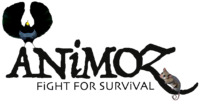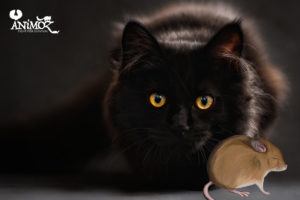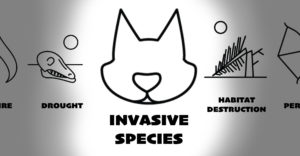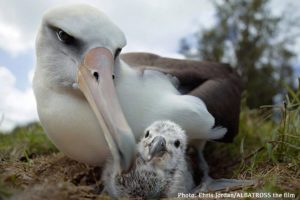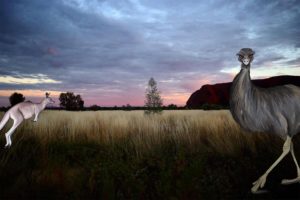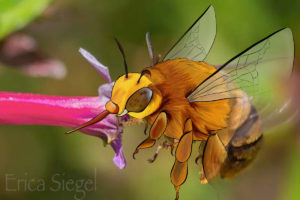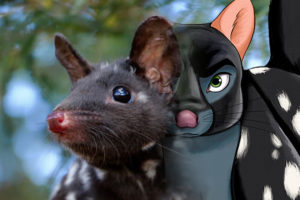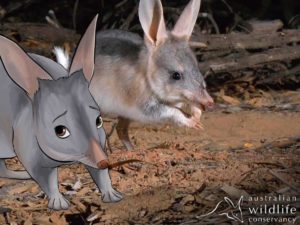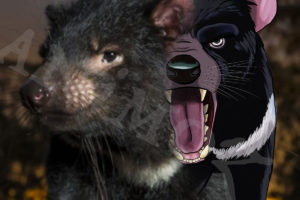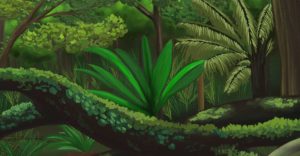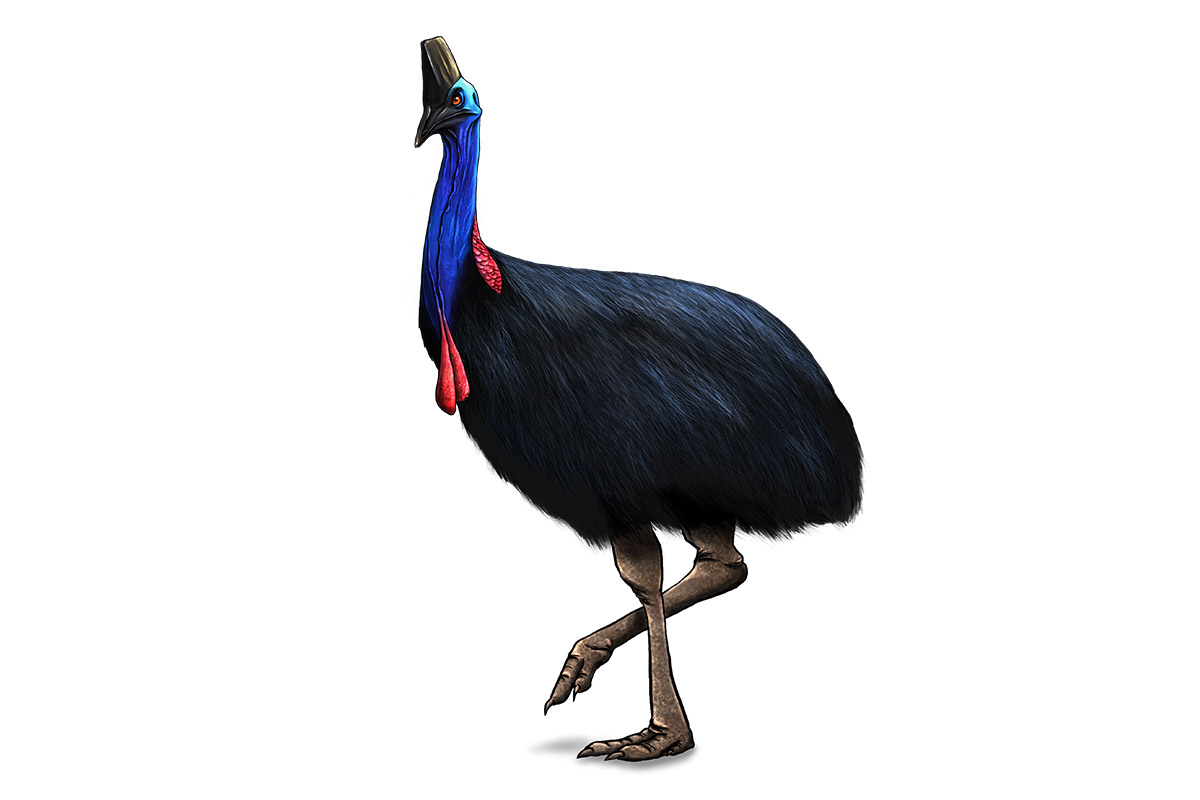
ARiUS - Southern Cassowary
ANiMOZ #214
Code: ARiUS
Common name: Southern Cassowary
Taxonomy: Casuarius casuarius
Level: OMNI | Form: DEFEND
Status: INFREQUENT | BiOME: FOREST
Overcomes: FLOOD | DROUGHT
SUPERPOWERS:
FISHDRAW
ARiUS knows that to some fish, his bristly feathers look like reeds. So he uses his Fishdraw power to wade into a stream, stand still whilst fish hide in his feathers, before walking on to the bank, shaking them out, and having a free feed!
INFRASONIC
The casque - or helmet - on the top of ARIUS’s head is what makes her Infrasonic power possible. Using this special equipment, she can hear the infra-sonar rumbling of other ARIUS from potentially hundreds of kilometres away, even through thick forest! This amazing trait enables communication that might help protect chicks whilst the father looks after them.
TOXINATOR
ARiUS can stomach some plants that most species have to avoid! Using her Toxinator power, she removes toxins from dangerous plants to enable digestion, without the danger!
GERMINATOR
Up to 100 plants in his rainforest home depend entirely on ARiUS to distribute their seeds, and some wouldn’t germinate if he didn’t eat them! When ARiUS eats the seeds of the Cassowary Plum - which is poisonous to Rangers and most animals - the enzymes in his stomach help to digest the seed, and then his droppings remove an inhibitor that stops them growing, meaning they sprout with about 90% success rate!
WEAKNESSES:
STONi
Because ARiUS lives not only in her Forest home, but alongside River BiOMEs too, she is at risk of falling prey to STONi. She automatically loses this Clash.
CONSTRICTION
Young ARiUS chicks are at risk from attack. If Dad isn’t watching closely, a python can make an easy meal out of them. He automatically loses a Clash to a CONSTRICTION species, or one with the CONSTRICTION Superpower.
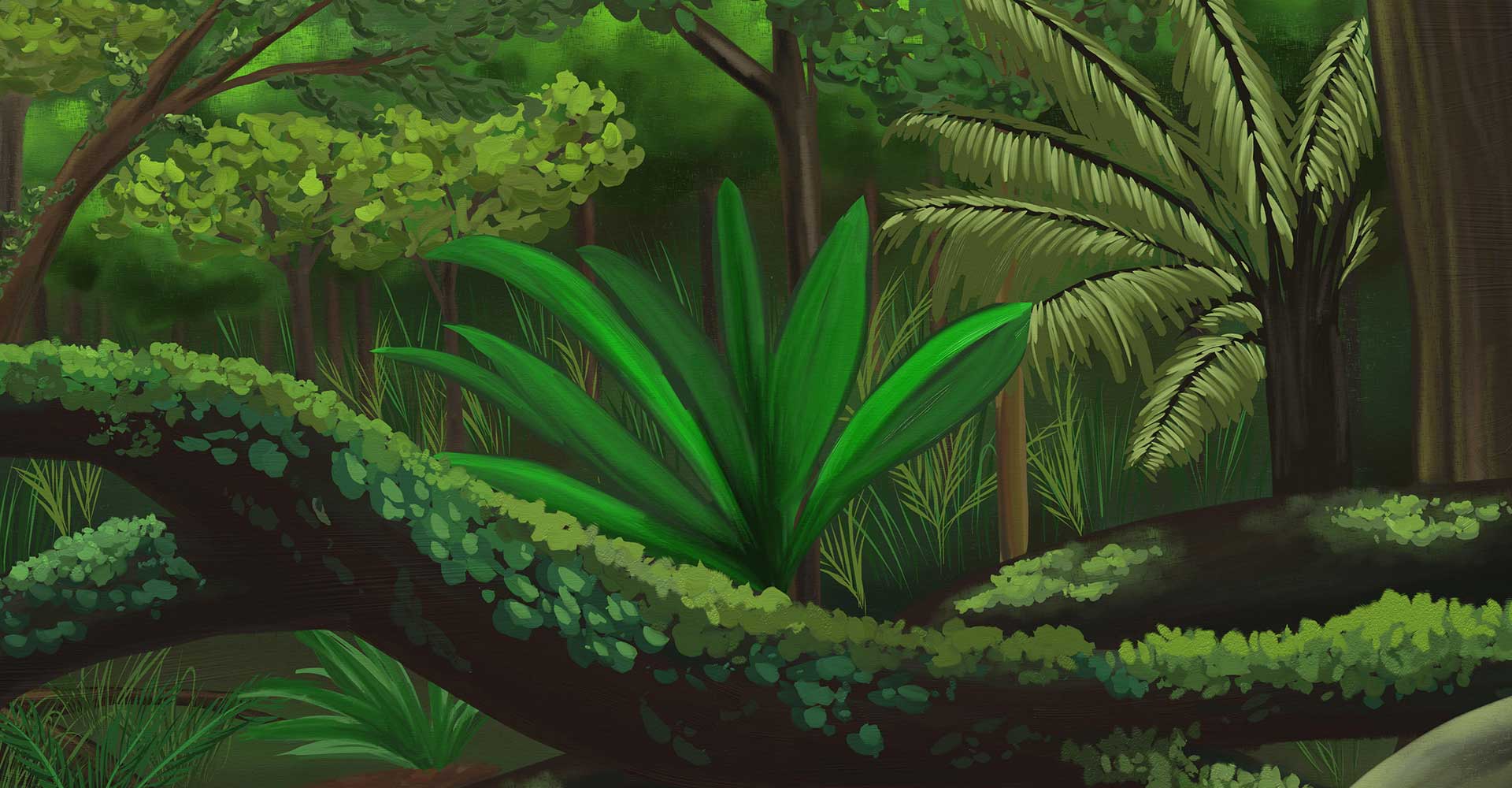

How to be a responsible cat owner in Australia
Here’s a few things you might already know about cats: 1. In Australia, over 1 million native birds are killed by cats every day. 2. In Australia, some 6 million native reptiles are killed by cats every year. 3. In Australia, we LOVE cats: there are about 4 million cats kept as pets. So, how …
We asked some kids to tell us about Australian animals…
We believe the next generation of leaders will be the ones to save our crumbling ecosystems. Australia is in the midst of a biodiversity crisis, and a key part of saving these incredible animals is knowing how special they are and falling back in love with nature. People will save the things they love. And …
We asked some kids to tell us about Australian animals… Read More »
Invasive predators gone from Newhaven
This article was originally published as ‘Newhaven Wildlife Sanctuary Stage 1 Declared Feral-free’ on Australian Wildlife Conservancy’s News site. AWC’s ambitious project to restore central Australia’s lost biodiversity at Newhaven Wildlife Sanctuary has reached a new milestone – the eradication of all feral predators from the 9,400-hectare fenced area, making Newhaven home to the largest …
ALBATROSS: An emotional migration
We know what we have done to the world, and we have the technology to fix it. Do we, and our future leaders, have the motivation? In the heart of the great Pacific, a story is taking place that may change the way you see everything. ALBATROSS is a documentary offered as a free …
We can still save Australia’s animals!
There is a LOT of negative news out there about climate change, the biodiversity crisis and the impact we’re having on our planet. And rightly so… Yes, we’re having disastrous effects and have pushed into the sixth extinction without looking back. However, it isn’t all bad – there are still ways to fix this, and …
Meet BOMBi – Australia’s Teddy Bear Bee
The Australian Teddy bear bee is BOMBi! Australia’s Teddy bear bee (Amegilla bombiformis – or as our Rangers know him: BOMBi) is one of the many Australian pollinators suffering from habitat destruction and industrial agriculture. In ANiMOZ, BOMBi is a Base species who can be found in the Coast BiOME and helps rangers overcome Floods, …
Eastern quolls back in the wild on the mainland
In 2018, the Eastern quoll (RiNU, for the ANiMOZ Rangers out there) was returned to the wild in New South Wales, after going extinct on the mainland 50 years ago. This important predator of Australian forests and scrubland still survives in Tasmania, but human persecution and invasive species wiped them out on the mainland …
The first wild-born Bilby in NSW in 100 years!
Rangers, we’ve got exciting news to tell you about LAGOTi (The Greater bilby)! Ecologists with Australian Wildlife Conservancy have recorded the first Bilby born in a NSW National Park in more than a century! Last year the NSW Government’s Saving Our Species program supported AWC in returning Bilbies – one of Australia’s most iconic threatened …
How is ANiMOZ supporting Aussie Ark?
Here at Ranger Headquarters, we aim to improve the futures of Australia’s animals. They are facing dangers on all sides. What better way than to support the work of Aussie Ark? Pre-sales instead of Crowdfunding We considered raising funds for the first print of ANiMOZ – Fight for Survival through a crowdfunding platform like Kickstarter. …
Introducing ANiMOZ – Fight for Survival!
Welcome, Rangers, to the game changing conservation! In the world of ANiMOZ, you are a Ranger tasked with protecting rare and endangered animals, and building healthy ecosystems to let your species thrive. The world of ANiMOZ… “Deep in the dark of the forest under a starlit night sky, RiNU* emerges from a hollow log. …
- « Previous
- 1
- …
- 3
- 4
- 5
